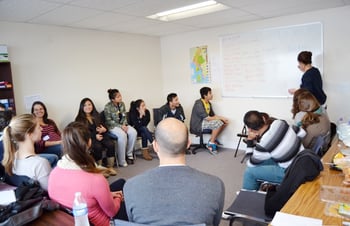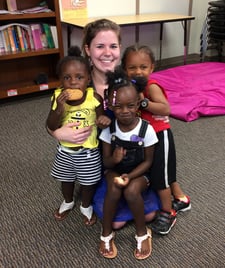In October, ACCORDS (Adult and Child Consortium for Health Outcomes Research and Delivery Science) and the Colorado Clinical and Translational Sciences Institute invited a panel of several current and former students from the University of Colorado School of Medicine to share their experiences working on community-based projects with the Committed to Community program through 2040 Partners for Health, an Aurora, Colorado based nonprofit that works to eliminate health disparities and improve health in marginalized communities in the Denver metro area.
As part of their requirements, all medical students must complete a Mentored Scholarly Activity, an in-depth scholarly project in an academic area of interest related to medicine or health care with the mentorship of a School of Medicine faculty member. Some choose to do science experiments, literary reviews or research studies, but others opt to be part of long-term community-based projects that they commit to for their full medical school experience.
Panel participants said the community-based projects — which put students to work helping underserved communities throughout the Denver metro area — were among the most valuable parts of their medical education and provided a blueprint for the ways they wanted to reach out to and interact with communities when they started to practice medicine.
The Importance of Trust
Katie Havranek, a fourth-year medical student, works with Iraqi refugees and migrant communities to offer direct community service. She also is helping conduct a research study to better understand barriers to medication adherence, as well as to explore the communities’ distrust of the U.S. health care system.
“Community work expanded my understanding of where and how we should be delivering health care,” Havranek said during the panel discussion. “Particularly in the refugee community, there’s a lot of distrust in the U.S. health care system and the U.S. government. I saw there was a lot more comfort in interacting with physicians in a community center where they felt safe. There are a lot of ecosystems that exist outside of the health care system that I think are not utilized, and people feel more comfortable there than they feel in a hospital or a clinic.”
Havranek said she also learned how important it is for doctors to build trust with the communities they serve. She learned that, in Arab cultures, physicians are seen as healers with whom patients form deep personal connections.
“It’s made me think more deeply about when I am interacting with patients, making sure to not be looking at the computer,” she said. “To make sure to do a physical exam even if I don’t necessarily need a physical exam at that appointment. It’s about the ways I can make people feel that I genuinely care about their health and them personally. That’s really important to this community in particular, but it’s really important for all patients. It’s changed the way I view how I’m going to be a clinician.”
Up Close and Personal With Health Disparities
Another fourth-year medical student, Benjamin Fuller, is part of a community-based research initiative addressing alcohol use in the Burmese refugee population in the Aurora area.
“Beyond all the data, working in partnership with the community over the past few years has impacted me dramatically, personally and professionally,” he said. “It’s really allowed me to get a better glimpse of the health disparities and health inequities that we are taught in the classroom. Being able to put a face on that has definitely had more of an impact on me. Being able to know these people personally and them sharing their experiences with me has really inspired me, as a future physician, to be an advocate for patients both inside and outside the clinic walls.”
Becoming a Better Doctor
Other students and alumni spoke of their work on similar projects, including empowering youth to advocate for their own health and consider health care careers; ending teen obesity; and looking at the racial disparity in infant mortality that exists in Colorado and nationwide.
“We’ve known for many years that babies born to Black women tend to die at a much higher rate than babies born to women of any other race,” said Kathryn Kalata, a pediatric intern at Children’s Hospital Colorado and recent CU School of Medicine graduate who helped to found the infant mortality project. “We also know the maternal mortality rate is high among Black women. And this persists across socioeconomic status and education level.”
Members of the research team work with members of the community, including women in the community, nonprofit organizations and academic partners, to understand factors underlying the racial disparity in infant mortality.
Kalata called her work on the infant mortality study the “single most defining part of my medical school experience.”
She said the community members she works with “have taught me so much in terms of experiences with health care providers. They have, through their stories and their experiences, modeled to me and informed me of the type of doctor that I want to be. This is something I don’t think I could have read in a book. It’s challenging at times, and it involves talking about uncomfortable topics, talking through mistakes and persevering. The different skills that I’ve learned in this process are going to help me be a better doctor.”






